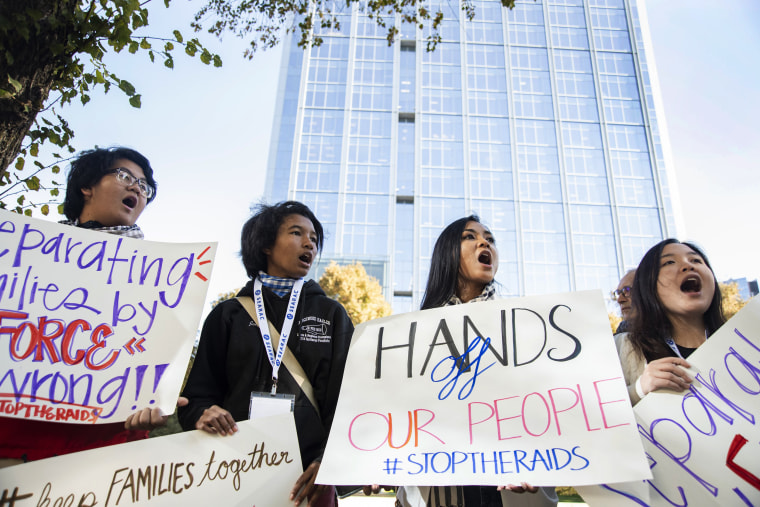U.S. Immigration and Customs Enforcement deported an estimated 25 Cambodian immigrants this week, the agency confirmed Friday to NBC News.
The group, which largely consisted of individuals who arrived in the country legally as refugees after the Vietnam War but have been convicted of crimes, left for Cambodia on Monday. This was the first round of repatriations this year, even as deportations in the Southeast Asian community have significantly increased under the Trump administration.
Kevin Lo, a staff attorney at the civil rights organization Asian Americans Advancing Justice – ALC, described the deportations as part of “the ongoing attacks by the Trump administration on this vulnerable immigrant population.”
“We expect ICE to conduct nationwide raids on this community again in the near future,” he said.
Lo, whose organization has been in contact with many of the families affected, explained that a sizable number of the deportees were born in refugee camps and many have never been to Cambodia.
In the past two fiscal years, the deportation of Cambodian nationals has increased by 279 percent, according to ICE data. However, the country continues to be listed as one of a handful that ICE considers “recalcitrant,” or uncooperative in issuing travel documents the U.S. requires for deportation.
Katrina Dizon Mariategue, director of national policy at the Southeast Asia Resource Action Center, noted that the New Way Forward Act, immigration enforcement reform legislation introduced in the House in December, would have potentially prevented many of those who’ve been repatriated this week from being deported.
The act would roll back two strict Clinton-era immigration laws, the Illegal Immigration Reform and Immigrant Responsibility Act and the Antiterrorism and Effective Death Penalty Act. The laws had, in part, broadened the types of offenses that subjected legal immigrants to repatriation and further tied the criminal legal and immigration systems together.
The 1996 laws also prevented judicial discretion in immigration hearings, so that a judge would not be permitted to take into consideration the circumstances surrounding an individual’s case. For example, factors including an individual’s status as a caregiver, active member of society, or parent of U.S. citizens would not be examined.
“Basically the judges' hands are tied and you’re mandatorily attainable and deportable,” Mariategue said.
However, under the New Way Forward, judges would be able to review these cases, looking at all the factors involved before making a decision to deport someone. The Act would also introduce a provision on statute of limitations of five years or more. Currently, people who committed crimes decades ago are still at risk of being deported. Lo noted that many in the Cambodian community who are facing deportation have long avoided any contact with the criminal justice system and have established families and careers.
“For almost all the cases we've encountered, the crime was committed decades ago,” Lo said. “Since that time, most of these people have demonstrated that they have changed their lives, started families and are essential members of their communities.”
Those who are deported to Cambodia face significant challenges, particularly since many have no family ties, do not speak the language and face cultural barriers. Lo explained that once in Cambodia, deportees often have difficulty finding work, housing, medical access, mental health support and government identification.
“There is also a high rate of suicide and mental health issues,” he said. “They have no family or community support in Cambodia because their loved ones that didn't die in the genocide are now in the U.S.”
The subject of repatriations remains a source of tension between the U.S. and Cambodia. They reached an agreement in 2002 in which Cambodia consented to taking in a limited number of deportees. The agreement set off protests in the Cambodian American community, which raised humanitarian concerns around the repatriation of refugees.
The backlash prompted Cambodia to drastically cut back on deportations, and in August 2017, the country halted issuing travel documents for deportation. However when the Trump administration slapped visa sanctions on the country, barring high-ranking Cambodian officials and their families from traveling to the U.S., Cambodia responded by issuing roughly 50 travel documents by the end of the year.
While Mariategue said she can’t say for certain whether the administration will ramp up deportations, she noted that by looking at the rate in which people are being repatriated, it’s likely the number of deportees this fiscal year will surpass last year.
